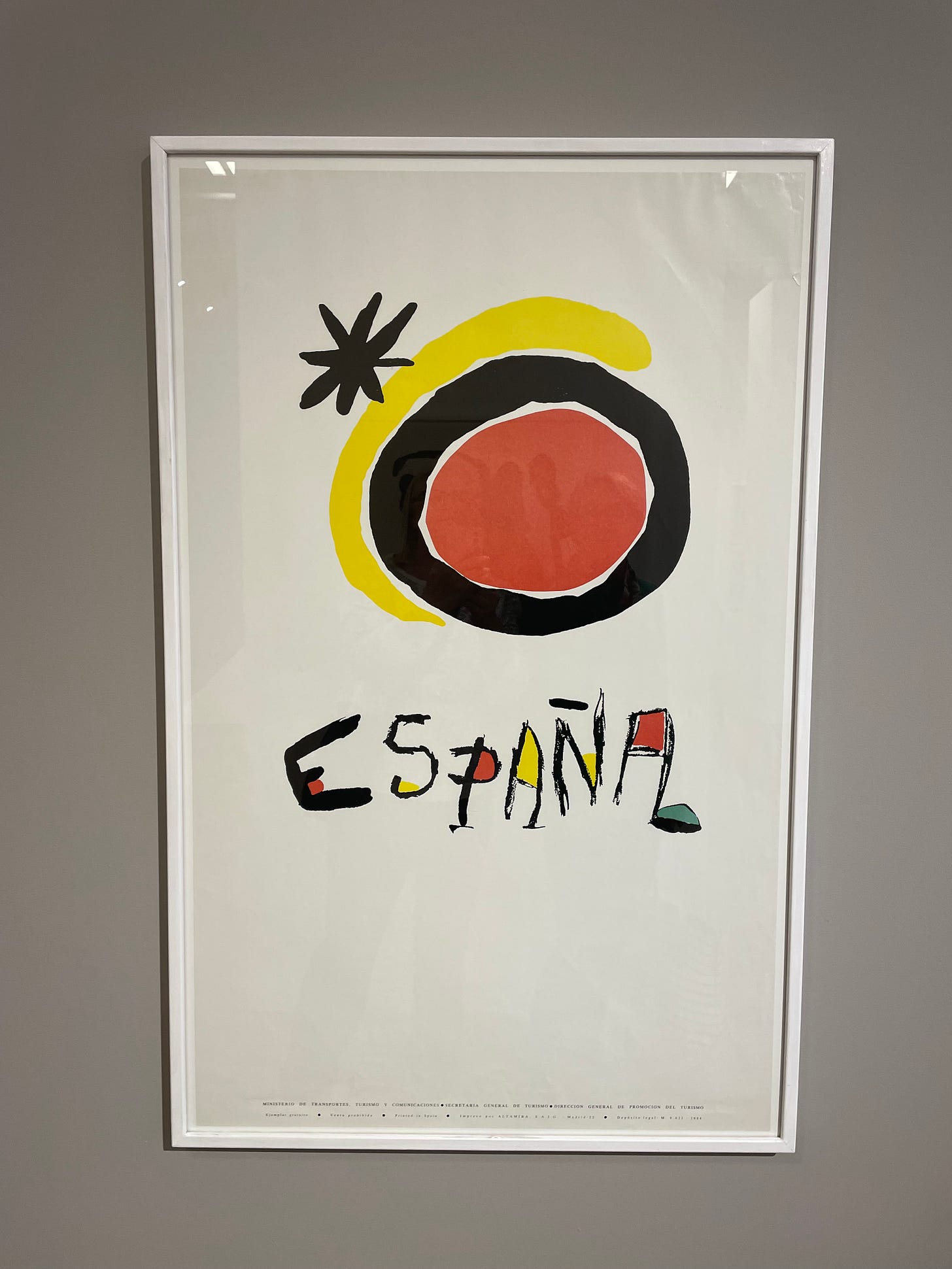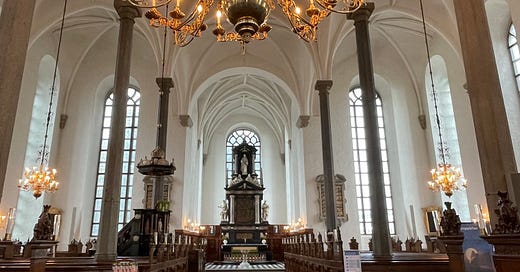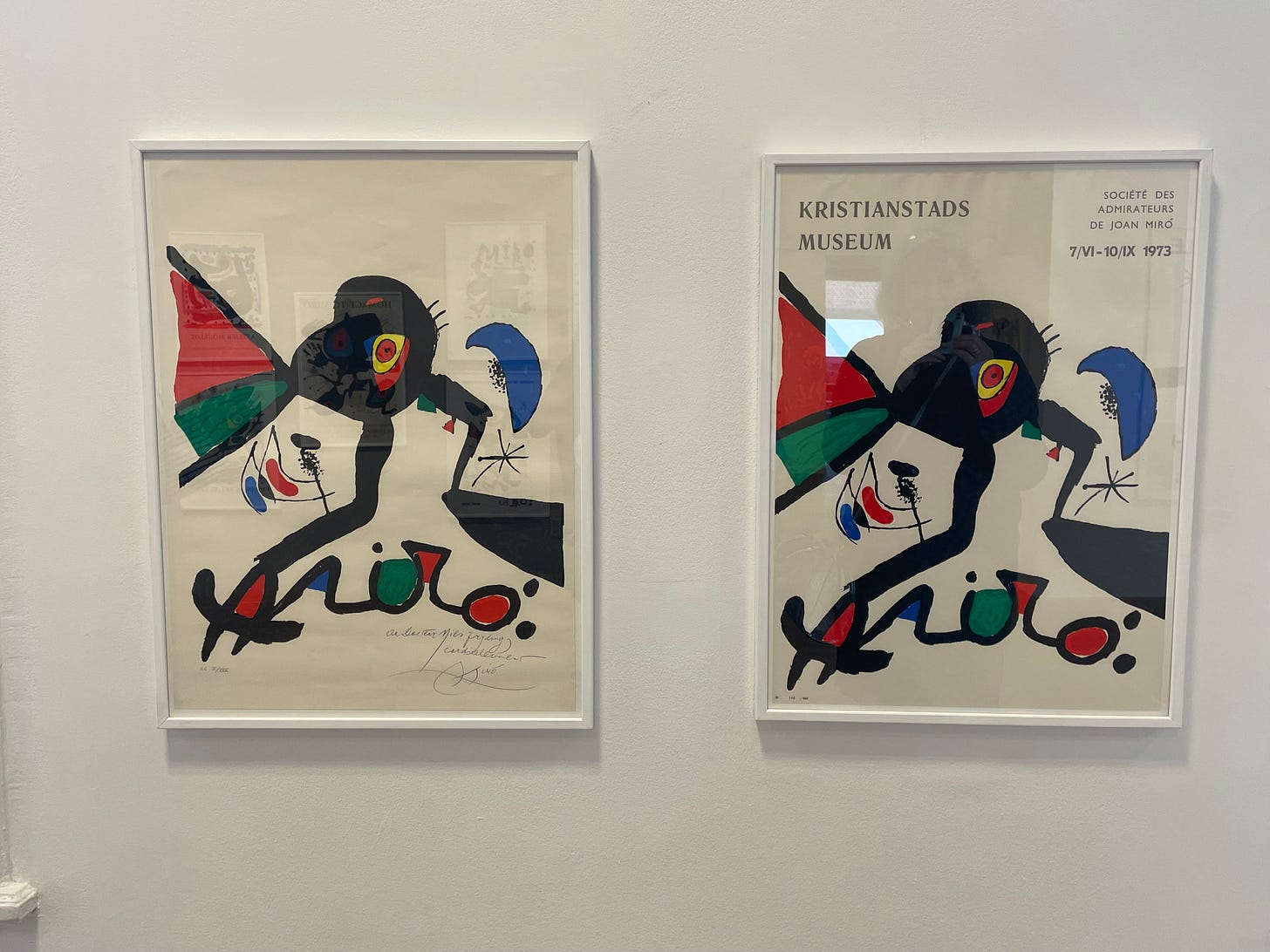Quote of the week
“You were right to tell me that in life it is not the future which counts, but the past.”
― Patrick Modiano, winner of the Nobel Prize in Literature 2014
Hello,
October is here, and in Sweden it is autumn. We still enjoy a few sunny days, and here in the south of Sweden it is still comparatively green. I love when nature changes into the glowing colours of autumn; yellow, orange and red.
October is the month for Nobel Prize winners and I am eagerly anticipating the prize in literature.
As for the padel qualifications, Austria did not make it. They won one round and lost one. I think Hannes appreciated being part of the whole thing though, and he is now back in Sweden.
Miró exhibition in Kristianstad
Kristianstad is a city about 100 km from where I live, and I went there for a gathering of former EU colleagues. We meet once a year for an excursion, lunch and possibilities to see each other again. The city was founded by King Christian IV of Denmark in 1614, and the name literally means “Town of Christian”. It was built to safeguard the eastern half of the province of Scania (Skåne) then belonging to Denmark. He also built a church (Danish: Trefoldighedskirken; Swedish: Heliga Trefaldighetskyrkan) which is considered to be one of northern Europe’s most beautiful Renaissance churches. The excursion also included a visit to the church which is very impressive and beautiful.
We were heading for the Regional museum which is housed in one of the oldest buildings in the city. Originally built as a stable for King Christian IV (1577-1648) but it seems it has only been used as a storage facility. Perfect as a museum though, situated by the big square in the centre of the city. Part of the museum is an Art Hall and there this quite unusual exhibition of Joan Miro’s work are exhibited.
So why has a rather small town in the south of Sweden access to such a unique exhibition? It started in 1958 when Nils Tryding, a laboratory doctor, visited the Unesco House in Paris and saw a Joan Miró painting. It was love at first site and he decided, then and there, to buy an original poster from a local art gallery. That was the beginning of a life long collection of original Miró exhibition posters.

Several years later he had collected a total of 154 posters. He was invited to Joan Miró’s 80th birthday and during the coming years he returned to Palma for the yearly celebrations. The two became good friends, and when Tryding told him that he wanted to organise an exhibition of his posters in Kristianstad, Miró said that he would paint the original poster (below)
Tryding died in 2020 but had earlier, in 2003 and 2012, donated his collection to the museum, including letters written by Miró to Tryding. It is an amazing exhibition, and we had a very good guide who told a fascinating story of a man starting a small collection that grew to become one of its kind in the world.
I am not a big fan of Miró, but when you hear the story of his life and work, and have the possibility to look closer at part of his work, it gives you another dimension. The common interest in an artist and his admirer’s collection is a rare treat.
Watching this week
I have been watching an interesting Danish tv-series on Karen Blixen, called ‘Dreamers - The Making of Karen Blixen’ (my translation) and covers the years when she returns to Denmark and starts her writing career. She is not an entirely sympathetic person, but with a strong will of achieving something. Beautifully filmed in her home at Rungstedlund. Two more episodes to go.
I introduced a very, long running tv-series to Hannes, ‘Silent Witness’. It seems it is season 23. I have not seen all seasons, but it is still a captivating series, which you can see even if you have not followed it. It is about a forensic team, solving murder mysteries, by forensic science. It is very well done.
Nobel Prize in Literature
The announcement of this year’s winner will be made on Thursday. I will go over to my local library where they show the announcement. You fill in a form to guess who will win, and the person(s) with the right answer will win a book. My guess goes to Joyce Carol Oates, and hopes that she will finally win. But who knows. Do you have any favourite winner?
6 October update: Well, I did not win anything. The prize went to French author Annie Ernaux, and she seems to be a worthy winner. The Nobel Committee awarded her the price for the "clinical acuity with which she uncovers the roots, estrangements and collective restraints of personal memory."
I have not read anything by her, but that will change now. Some Swedish literature critics recommends the following books to start with: Åren (2008) (Les années/The Years), Min far (1983) (La place/A Man’s Place) and Kvinnan (1988) (Une femme/A Woman’s Story)
Book club meeting
This week I had a book club meeting with neighbours. We read Violeta by Isabel Allende. She covers hundred years of history which Violeta tells her grandchild in the form of a letter. It is a story of a family, political turmoil and a woman’s talent of flexibility and survival in a constant changing world. Beautifully written, like everything Allende writes.
Links
If you want to read further, I have two blogs;
The Content Reader, (in English) where I write about books
and
Den tillfälliga besökaren (in Swedish) where I share my life and interests in books, history, travel and everything that makes life interesting.
If you want to leave a comment, or discuss something, you can comment in the post or send me an e-mail to thecontentreadernewsletter(at)gmail.com





